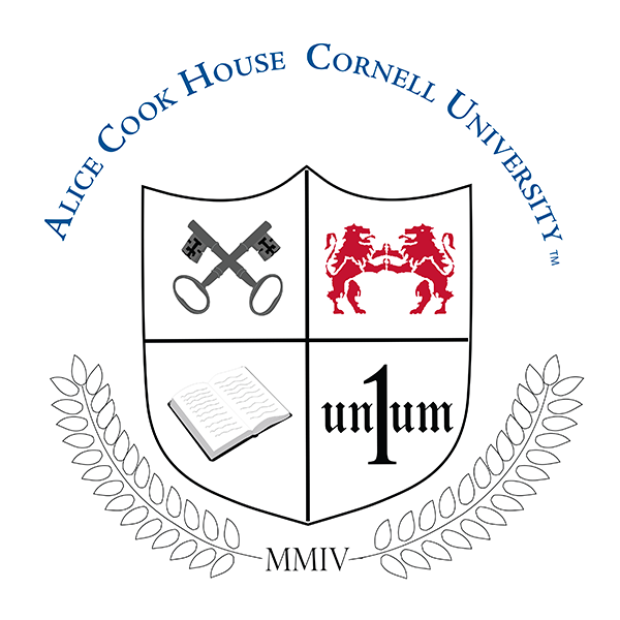Cook House History
House History
Alice Cook House is one of five residential colleges that make up Cornell University’s West Campus House System. The House opened in the fall of 2004 and was the first to open as part of the West Campus House System. It accommodates approximately 370 students in a vibrant living-learning environment. The House is named in honor of Alice H. Cook, a distinguished professor, labor historian, and advocate for equity and social justice, whose legacy continues to inspire the values of our community.
House Crest

Design elements throughout the Gothic wings of Alice Cook House draw inspiration from traditional seals and symbolic motifs, each chosen to reflect the values and identity of the House:
- Keys symbolize the shared governance of the House by students and faculty, emphasizing collaboration and mutual responsibility.
- The Book represents scholarship and the pursuit of knowledge.
- Lions are traditional emblems of collegiate houses at Oxford and Cambridge. At Cook House, they also signify a spirit of welcome and inclusivity—embracing all, even the “beasts of the field.”
- Unum, Latin for “one,” marks Alice Cook House as the first of the five Houses in the West Campus House System.
- MMIV denotes the year of the House’s founding: 2004.
- Apple branches evoke the natural beauty of upstate New York, grounding the House in its regional landscape.
These symbols were thoughtfully designed by Juliana Eisner ’05, Sara Jeruss ’05, and Hanoch Feit ’07.
Alice Cook
Alice Hanson Cook (1903–1998) was a pioneering labor educator, activist, and professor whose career spanned continents and decades. After graduating from Northwestern University, where she was a student activist, she began her work with the YWCA Industrial Department, supporting and educating blue-collar women. Her early career included teaching in progressive workers’ education programs and serving in leadership roles within major labor unions. Cook’s commitment to labor rights and adult education led her to post-war Germany, where she helped reestablish democratic trade unions under the U.S. Army’s direction, drawing on her fluency in German and deep knowledge of labor movements.
In 1952, Cook was recruited by Cornell University’s School of Industrial and Labor Relations (ILR) to lead a project on integrating unions and communities. She soon transitioned into a faculty role, teaching labor history and union administration, and producing influential research on union democracy, labor’s role in community affairs, and international labor movements. Her scholarship was groundbreaking, including studies on Japanese trade unions and comparative labor relations across eleven industrialized countries. She was also a Fulbright scholar and a prolific author, whose work shaped public policy and academic discourse alike.
Beyond her academic contributions, Alice Cook was a transformative figure at Cornell. She became the university’s first Ombudsman, co-founded the Women’s Studies Program, and helped open the Faculty Club to women. Her advocacy extended into the Ithaca community, where she supported numerous women’s organizations. Even after retiring in 1973, she continued her global research and writing, mentoring countless students and colleagues. Alice Cook’s legacy lives on in the values and mission of Alice Cook House, the first residential college in Cornell’s West Campus House System, named in her honor to celebrate her lifelong dedication to equity, education, and social justice.
